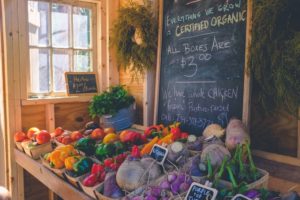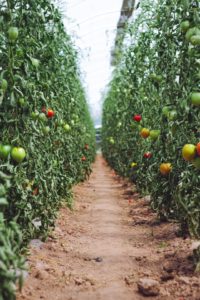From 2000 to 2017, global sales of organic food increased by 77 billion USD. Many consumers pay top dollar for organic foods, which they consider a healthier, safer, tastier and more environmentally-friendly option. A new study by the Food and Agriculture Organization of the United Nations has broken down whether or not organic food is safer to eat, and why.

What does USDA Organic certification actually mean?
Many consumers are unaware of the organic certification process and what it entails. If an item is certified organic, it indicates that the products were produced in accordance with certain standards throughout the production, handling, processing and marketing stages. These standards aim at a different set of benefits:
- Better incomes for small-scale farmers and increased food security
- Environmental benefits such as improved soil and water quality
- Biodiversity preservation, and improved animal welfare
While organic agriculture may relate to a set of improved practices, the term organic in and of itself is not a guarantee of food safety.
Is non-organic food just as safe as organic food?
Yes. All food is required to undergo a safety assessment, regardless of how it is grown. The difference between organic and non-organic food is largely related to production, as organic farming avoids the destructive nature of large-scale agro-industrial practices. So while large-scale farming may be more destructive to the environment, it does not create food that is less safe for consumption.
What is organic agriculture?
 According to the International Federation of Organic Agriculture Movements (IFOAM), “Organic Agriculture is a production system that sustains the health of soils, ecosystems, and people. It relies on ecological processes, biodiversity and cycles adapted to local conditions, rather than the use of inputs with adverse effects. Organic agriculture combines tradition, innovation, and science to benefit the shared environment and promote fair relationships and good quality of life for all involved.”
According to the International Federation of Organic Agriculture Movements (IFOAM), “Organic Agriculture is a production system that sustains the health of soils, ecosystems, and people. It relies on ecological processes, biodiversity and cycles adapted to local conditions, rather than the use of inputs with adverse effects. Organic agriculture combines tradition, innovation, and science to benefit the shared environment and promote fair relationships and good quality of life for all involved.”
Food safety and organic agriculture
For many consumers, food safety relates to the potential for contamination by agrochemical (mostly pesticides) residues, and by microorganisms that cause disease (e.g. Salmonella) during the production phase.
In reality, organic farms also use pesticides. These pesticides are of plant origin, and studies have shown that over 99 percent of pesticides in U.S. diets are produced physiologically by plants. At high dosages, even these naturally-occurring pesticides can be considered carcinogenic.
Various “organic” labels rely on rules that prohibit the use of fertilizers and agrochemicals, under the belief that omitting these types of inputs ensures that the food is safe. But chemical and biological contaminants may occur throughout food production and market distribution processes, whether the food is labeled organic or not. In addition, the way foods are stored and conserved by each consumer also makes a difference in mitigating the risks of food contamination.
In summary, the choice of organic foods and farming has little to do with food safety standards, but is rather dictated by the consideration of social and environmental aspects of food systems. And with many families, cost is another major factor in whether or not they can partake in an organic diet.
If you or a loved one have suffered a foodborne illness, and believe it relates to negligence during the food manufacturing process, call Allen & Allen today for a free consultation at 866-388-1307.




